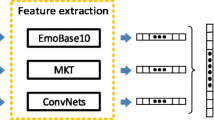Abstract
Music video is a well-known medium in music entertainment which contains rich affective information and has been widely accepted as emotion expressions. Affective analysis plays an important role in the content-based indexing and retrieval of music video. This paper proposes a general scheme for music video affective estimation using correlation-based feature selection followed by regression. Arousal score and valence score with four grade scales are used to measure music video affective content in 2D arousal/valence space. The main contributions are in the following aspects: (1) correlation-based feature selection is performed after feature extraction to select representative arousal and valence features; (2) different regression methods including multiple linear regression and support vector regression with different kernels are compared to find the fittest estimation model. Significant reductions in terms of both mean absolute error and variation of absolute error compared with the state-of-the-art methods clearly demonstrate the effectiveness of our proposed method.
Access this chapter
Tax calculation will be finalised at checkout
Purchases are for personal use only
Preview
Unable to display preview. Download preview PDF.
Similar content being viewed by others
References
Arifin, S., Cheung, P.Y.K.: Affective level video segmentation by utilizing the pleasure-arousal-dominance information. IEEE Transactions on Multimedia 10, 1325–1341 (2008)
Sun, K., Yu, J., Huang, Y., Hu, X.: An improved valence-arousal emotion space for video affective content representation and recognition. In: IEEE International Conference on Multimedia and Expo. (ICME), pp. 566–569. IEEE Press, New York (2009)
Hanjalic, A., Xu, L.Q.: Affective video content representation and modeling. IEEE Transactions on Multimedia 7, 143–154 (2005)
Soleymani, M., Chanel, G., Kierkels, J.J.M., Pun, T.: Affective characterization of movie scenes based on multimedia content analysis and user’s physiological emotional responses. In: Tenth IEEE International Symposium on Multimedia, pp. 228–235. IEEE Press, New York (2008)
Valdez, P., Mehrabian, A.: Effects of color on emotions. Journal of Experimental Psychology 123, 394–409 (1994)
Xu, M., Chia, L.T., Jin, J.: Affective content analysis in comedy and horror videos by audio emotional event detection. In: IEEE International Conference on Multimedia and Expo. (ICME), pp. 621–625. IEEE Press, New York (2005)
Zhang, S., Huang, Q., Tian, Q., Jiang, S., Gao, W.: Personalized MTV affective analysis using user profile. In: 9th Pacific Rim Conference on Multimedia: Advances in Multimedia Information Processing, pp. 327–337. Springer, Heidelberg (2008)
Zhang, S., Huang, Q., Tian, Q., Jiang, S., Gao, W.: i.MTV - An integrated system for MTV affective analysis. In: Demonstration in ACM Multimedia, pp. 985–986. ACM, New York (2008)
Zhang, S., Tian, Q., Jiang, S., Huang, Q., Gao, W.: Affective MTV analysis based on arousal and valence features. In: IEEE International Conference on Multimedia and Expo. (ICME), pp. 1369–1372. IEEE Press, New York (2008)
Hall, M.A.: Correlation-based feature selection for machine learning. Doctoral Dissertation, The University of Waikato, Department of Computer Science (1999)
Weka 3: Data Mining Software in Java, http://www.cs.waikato.ac.nz/ml/weka/
Vapnik, V.N.: Statistical learning theory. John Wiley and Sons, New York (1998)
Gunn, S.R.: Support vector machines for classification and regression. Image Speech and Intelligent Systems Research Group, University of Southampton, U.K (1998)
Author information
Authors and Affiliations
Editor information
Editors and Affiliations
Rights and permissions
Copyright information
© 2010 Springer-Verlag Berlin Heidelberg
About this paper
Cite this paper
Cui, Y., Jin, J.S., Zhang, S., Luo, S., Tian, Q. (2010). Correlation-Based Feature Selection and Regression. In: Qiu, G., Lam, K.M., Kiya, H., Xue, XY., Kuo, CC.J., Lew, M.S. (eds) Advances in Multimedia Information Processing - PCM 2010. PCM 2010. Lecture Notes in Computer Science, vol 6297. Springer, Berlin, Heidelberg. https://doi.org/10.1007/978-3-642-15702-8_3
Download citation
DOI: https://doi.org/10.1007/978-3-642-15702-8_3
Publisher Name: Springer, Berlin, Heidelberg
Print ISBN: 978-3-642-15701-1
Online ISBN: 978-3-642-15702-8
eBook Packages: Computer ScienceComputer Science (R0)




